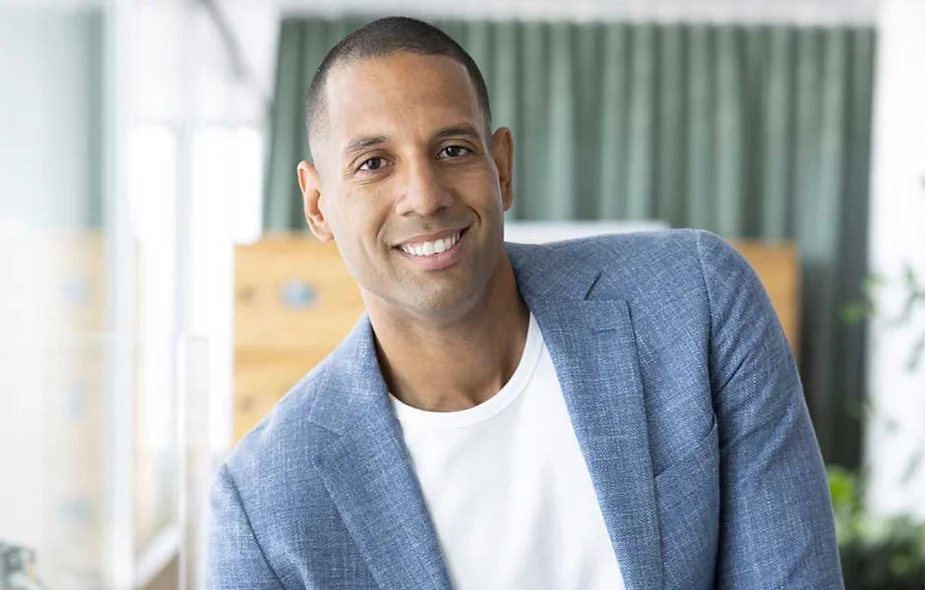Davidek Herron, Global Head of Digital at Roche, speaks to Isabel O’Brien about his passion for technology, the myths surrounding digital transformation and his thoughts on teamwork and failure from his time playing professional basketball
Words by Isabel O’Brien
When I virtually met Davidek Herron, he had just returned from a family holiday in the Canary Islands – a much needed break to recharge after having recently relocated from the Netherlands to Basel, Switzerland. The move came after he became Global Head of Digital at Roche last year, and it’s safe to say he and his family are enjoying the change of scene, as well as all that Europe has to offer.
Herron grew up in New York City, where he had both a love for sports and a dream to become an orthopedic surgeon. Attending college on a double sports scholarship to study biochemistry, he was later accepted into Albany Medical College. But then professional basketball came calling. “It was a difficult decision at the time,” he recalls. “But, ultimately, I decided to play professionally overseas because I’d never had a chance to travel across the pond.”
After playing in Germany, Czech Republic and the Philippines, Herron returned to the US and secured his first job in pharmaceutical sales for a women’s health company, landing a position that was asking for 15 years’ experience. “I had zero experience, but I earned their trust,” he explains. In this role, he had the chance to meet world-renowned physicians who offered him one crucial piece of advice: if he truly wanted to make a change in healthcare then he had to move up in the model and break it.
What followed was a nearly-10-year career at Teva working in digital transformation, with his final role being Global Head of Digital Platforms and Operations before he headed for Roche. But Herron’s interest extends far beyond digital transformation and technology. It is rooted in the impact of such innovations on patients and their quality of life. “I think every industry has a value to add, but in healthcare there is literally life and death at the end,” he says. “Doing something that can help people have healthier days or enjoy moments in life that they might not have been able to — that is what really makes me smile.”
How did your experience as a professional basketball player and coach prepare you for a career in the pharmaceutical industry?
Time management is the first one. Even in college, having to manage eight-hour labs then dual-sports, you learn time management very quickly. But really, it’s around goal setting and learning to accept failure. You hear people say, ‘hey, accept failure’ and, in sports, you have to accept it, understand it and learn from it to drive forward. It’s also about teamwork and about people. Digital is just the evolution of how we interact with the world – it is all around people.
You can empower thousands of people with digital data insights to do amazing things
What I learned from coaching and playing basketball is the importance of being all in this together, while still having different passions and goals. You need outcomes as a team that you want to achieve. A team must be all driving towards the same outcome, whether it’s winning a championship or seeing the impact of a specific new indication on patients.
What drives your passion for working in digital?
I’ve always loved technology. Even as a child, that was always my thing. I probably upset my parents because I used to always take things apart from a computer perspective. My way of disconnecting is learning something. Recently, I jumped headfirst into the metaverse to understand what it truly is. I was engulfed for hours, fascinated. And I’m in this industry to drive better outcomes at scale. There aren’t many other ways of doing this other than digital. Look at the last 10 years; we’ve come so far in the development space and drug discovery. There are many examples of how this has been really good for the industry, but even better for society. You can’t continue to hire thousands and thousands of people, but you can empower thousands of people with digital data insights to do amazing things. I think that’s where the excitement really comes from.
What are the key myths that exist around digital transformation?
Sometimes we get too stuck in the word ‘digital’. It’s really about how to enable and empower our people, it is not about digital replacing people. We’re not talking automation, it’s about how we in pharma work with patients, healthcare providers and government systems in a way that is simple, consistent and seamless. It also about how we’re partnering with government healthcare systems to move things forward. Unfortunately, myths still exist that digital is all about IT and technology. Early on in my own career, I’ll call it out, I leaned in too much to technology. I thought it was the solution, but it’s not about the technology. There are many different technologies, from blockchain to Salesforce, et cetera, but it’s about the people behind them. It’s about creativity. How do we leverage all these amazing insights to really drive better outcomes as a society?
How can pharmaceutical companies build trust in solutions that harness artificial intelligence, in particular machine learning?
AI and machine learning have been around for years, but there’s been more buzz around them lately because of advancements. For example, we recently created a breast cancer AI tool for certain markets. In the past, physicians may have missed some things when doing mammogram readings. Now we’ve created this tool to partner with the physicians and it has over 96% accuracy. So, this is actually saving lives. We must lean into examples of where AI is currently working today and how it’s empowering us. We do have some concerns and we hear bad news around certain algorithms benefitting certain racial groups, or not in some cases. We do need to make sure there are compliance structures, formats and frameworks in place to help prevent that moving forward because there’s still so much we don’t know about it. But so much good is already happening.

What skills will future generations of workers need to ensure the industry can continue its path of digital transformation?
We don’t need to all become data scientists, but creativity and strategy will be key. We lean in a lot to the old ways of doing things, but a new generation needs to leverage creativity, while leveraging some of these new platforms and technologies. That’s going to be a key skill set to have. Again, it’s not about digital, it’s about advancing our current ways of working. If you look at the Fortune 500 companies list, only 17 companies did not exist 25 years ago. And those 17 companies include Google, Apple, et cetera. There are still a lot of legacy companies succeeding in this new era. How are they doing that? They’re changing and involving their business.
We don’t need to all become data scientists. Creativity and strategy will be key
Look at the Wall Street Journal, for example. They’re going from paper to online subscriptions. But it must be a gradual shift, it’s not going to happen overnight. Maybe you need to have more of a strategic mindset versus a tactic-focused mindset. There is no right or wrong answer, but it is about understanding what time and history has shown us and understanding the skills that could be the drivers of change.
Having worked in different countries and companies all over the world, what have you found to be the secret to job satisfaction?
What really brings me joy is being able to break bread with different cultures, different people and different understandings. That’s why I’ve chosen to leave my comfort zone in the US [and move to Basel]. Sometimes you have to step out of your comfort zone to truly understand the other side. The secret to satisfaction is being able to understand customers, patients and healthcare providers. It’s not like it’s a market research, you’re on the ground, you’re having dinners, you’re talking with people. That’s satisfaction.
Also, I’m a foodie and I love food from different areas. So, that’s something else I also enjoy, but really, it’s about understanding people and being in different environments, and being able to understand the reality. Leaders are so far removed sometimes. It is important to get closer to reality because ultimately the aim is to drive better patient outcomes. To do that, you need to understand what’s going on to drive that at scale.









